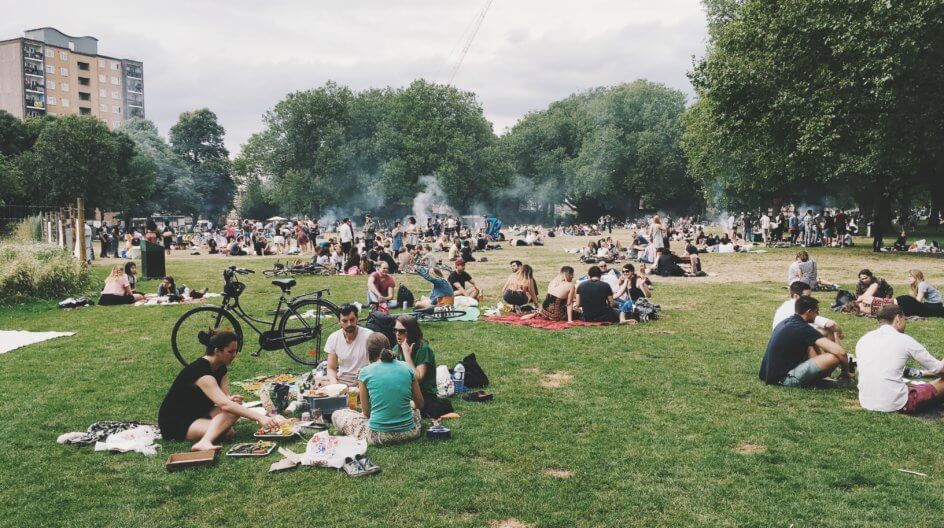Make the Backbone of Relationships and Communities Fun Again!
Small talk is an underrated tool and one of the vital components in building strong relationships and communities. However, the age of the smartphone has enabled most people in the modern world to avoid it.
Think about the last time you sat in the waiting room of a doctor’s office. Or a conference room in the minutes leading up to a meeting. Or even a bus stop.
What felt more comfortable? Striking up a conversation with the person nearest to you? Or pulling out your phone to kill time?
Unfortunately, every time you pull your phone out instead of making small talk with the people around you, you grow more isolated. Your refusal to connect with others leaves you more disconnected. In addition, you are losing out on personal and professional opportunities because each person you avoid talking to could have led to amazing new friendships, relationships, adventures, business partners, or job opportunities.
Why do so many people avoid making small talk if the benefits are potentially life changing?
Because small talk can feel clunky, shallow, and awkward.
But I have great news for you: small talk doesn’t have to be any of those things!
In fact, small talk can be interesting, playful, and fun for everyone.
“When you are interested, you are in turn interesting.” – AJ Harbinger
To make small talk interesting, you start by being interested in the person you’re talking to. This little switch in mentality can lead to big results.
If you just make small talk to fill the awkward silence when you’re sitting next to someone at the bus station, you can end up with a conversation that goes something like:
- “This weather sucks.”
- “Yeah, it does.”
- “How’s your day?”
- “Good. You?”
- “Same.”
Riveting conversation, isn’t it?
That is the kind of bland exchange that gives small talk a bad rep.
Let’s redo that same interaction, but with a small change. What if you noticed the other person had one of the Game of Thrones novels on his lap?
- “I’ve heard great things about the Game of Thrones books. What do you think so far?”
- “Oh, man, these books are great! George R.R. Martin does a bang up job with his imagery. I’ve tried watching the show based on a couple scenes from the book, and it was like watching a high school play compared to the grand imagery George’s writing generated in my imagination. And the way he weaves together different events and character deaths. It’s mind blowing to think about how difficult it would be to keep track of everyone while writing these stories.”
Small talk can lead to great conversations, but you have to show interest in the person you’re speaking to.
“Small talk is actually about showcasing interest in the other person.” – AJ Harbinger
Fortunately, the other person doesn’t need to be carrying anything in order for you to find something to be interested in.
Maybe he’s wearing a shirt with the name of a sports team on it. You can ask him what he enjoys about that sport, what his favorite games, matches, or moments are, and if he plays in any local leagues.
Are you walking around a local farmers’ market? There’s a solid chance you share a number of things in common with the people around you—supporting local businesses, eating healthy, promoting a strong community and ethical treatment of the environment.
What about that meeting at work? Rather than pulling out your phone as soon as you sit down, why not ask the person next to you what interesting assignments she’s working on or what plans she has that she’s excited about.
That last one raises a good point about the value of wording a question. Let’s say you ask the standard version:
- “What are you doing this weekend?”
- “Just hanging out, maybe do some laundry, catch up on some bills. You?”
- “Same.”
- “Cool.”
Let’s try that again, but with a different wording of the question:
- “What are you most excited about this weekend?”
- “I’m going to this new restaurant near my house! They supposedly have the BEST Thai food. I’m a big foodie so I pride myself on knowing the best spots. What about you?!”
- “That sounds great! I love Thai food—you’ll have to tell me how it is on Monday. I’m celebrating a friend’s birthday this weekend. We’re going camping out in the desert with a bunch of our friends. We look forward to this camping trip every year since we all live in different parts of the country now.”
- “It’s awesome you keep in touch with old friends like that. You guys must have a blast together. What have been some favorite memories from your previous camping trips?”
The first question (“What are you doing…”) can often lead the other person to think about a list of simple answers while the reworded question (“What are you most excited about…”) leads the other person to search her brain for something that gets her excited. This results in the person putting more emotion into her answer, leading her to be more invested in the conversation and asking engaging questions in return.
Making small talk can be easy and it can come naturally. You just have to be aware of where you are and what you’re doing.
“You become more like-able, the more interested you are in other people.” – AJ Harbinger
So why is small talk important? And why does a lack of small talk lead to a weak community?
Because the strength of a community lies in the relationships between its individual members. If the individual members of a community aren’t interacting with each other, those relationships don’t have an opportunity to grow.
Think about the city you live in. Imagine what life in that city would be like if people spent less time on their phones and more time making an effort to get to know one another during their day to day lives. Would your neighborhood be a friendlier place? Would the community be stronger? Would more people be active in local events and politics? Would the politicians in your community have a better idea of who they’re representing?
Small talk may not seem like a big deal when you’re trying to decide between killing time on your phone and going out of your way to strike up a conversation, but thousands of people opting for their phone over social interaction leads to a community of individuals further and further isolated from one another.
Think about what you want your life and your community to be. If you want to see your relationships and your community get stronger, then I challenge you to make a small effort everyday by making small talk with at least one person.
If you want more great tips on making small talk, including the biggest myth and 3 mistakes you need to avoid, check out our latest podcast on the subject!



